
Project Title
Code: 1.1
Postharvest Education in Vietnam: Improving Safety and
Quality Standards of Fresh Horticultural Products for
Domestic and Export Markets
Australian Personnel R A Jordan
Australian Institution University of Sydney, Faculty of Agriculture
Vietnam Institution Can Tho University; Hanoi Agri.Univ
Project Duration July 2000 – June 2002
Project Description
Fresh fruit and vegetables have become a major part of Vietnam’s crop production, and have
the potential to provide major export revenue. To enable Vietnam to exploit these markets
and meet the stringent quality standards required, much greater attention needs to be placed
on better postharvest handling, safety and packaging of fresh produce.
The purpose of the postharvest education program is to support the development of university
based courses, for both in house and distance learning, enhance the technical and research
skills of university and research scientists to enable them to become self sufficient in solving
postharvest problems, and to promote inter-university and institute collaboration. To
facilitate this process, staff will visit the University of Sydney to observe and participate in
postharvest training, develop relevant research skills and contribute to short course
development. This will be followed by short course presentations in Vietnam and
collaborative development of distance learning packages for rural outposts of the universities.
This program of activities will result in an increased capacity for the major universities to
engage in postharvest training and research as well as provide courses for students located in
rural communities. Many graduates from the participating universities join the extension
service and will pass on to the growers and wholesalers the knowledge and practices learnt at
university.
Aim
To support development of appropriate university-based courses for both in-house and
distance learning, to enhance the technical and research skills of university scientists and to
promote inter-university and institute collaboration.
Objectives
a. develop a postharvest curriculum that can be utilised by major Universities and also a
distance education equivalent for satellite institution teaching
b. facilitate development of research skills in university and institute scientists to enable
them to conduct meaningful research on local postharvest issues
c. upgrade knowledge base and technical skills of university personnel to allow flow
through of the technology to students and ultimately, the end users – farmers and
wholesalers
d. utilise collaborative research projects that have the capacity to demonstrate that accessing
markets requires an integrated approach to production, postharvest handling and
marketing

Outputs and Performance indicators
Outputs Performance Indicators
1. Curriculum and teaching
resource material for use in
Universities: distance learning
booklets and resource material
for rural teaching
i. Implementation of postharvest training curriculum
at the end of year 1. Student and staff evaluation of
courses will be conducted at the end of year 2.
ii. Access by rural communities to postharvest
education offered through distance learninng,
participation to be monitored in years 3 and 4
2. Vietnamese counterparts
trained in Sydney for 14 weeks
in advanced postharvest
research techniques
i. A research report will be prepared in year 1
outlining key information and research skills
developed on one crop.
ii. In the longer term increased output of research on
postharvest handling of produce in Vietnam and the
transfer of results in refereed journals.
3. Short courses in postharvest
training for University staff at
Hanoi Agricultural University
and CTU
Evaluation sheets completed by participants at the
conclusion of each course. Assessment of understanding
gained and skills developed. Follow up evaluation of the
usefulness of the short course 6 months after course
completion.
4. Improved communication
and joint research projects
between research institutes and
the universities
Establishment of a collaborative working group (via e-
mail) that will share and encourage Co-operation in
teaching and research between the participants in such
areas as postharvest information, research methods and
problem solving. The group will be chaired by a different
host each year and participation and outcomes will be
monitored.

PROJECT COMPLETION REPORT
Executive Summary
Task 1 – Curriculum Development and Research Training.
Three researchers from three Institutes in Vietnam came to Australia. During that time they
carried out a research project, learnt new techniques and inter-acted with other researchers.
They attended the postharvest course run at the University of Sydney and they also had
access to libraries that allowed them to collect material for the development of a postharvest
teaching course they could use in Vietnam.
Task 2 – Introductory Postharvest Training Course
Dr Robyn McConchie and Dr Jenny Jobling ran a postharvest training course in Hanoi (4th to
the 8th December 2000). There were 16 participants from 5 different research Institutes. The
participants learnt new information and research techniques. The course lecture notes and
practical outlines could be easily translated for use in ostharvest training courses at their
Universities. The practicals used equipment and produce readily available in Vietnam to
demonstrate important postharvest principles lead and partner institutions.
Task 3 - Distance learning package development
A CD ROM on postharvest training and research techniques has been has been completed for
use by the participating institutions and extension personnel. The CD was trialed by the
participants at the last short course held in December 2001 and was very favourably received.
Minor adjustments to the CD will be made during the next month before final release. The
CD duly acknowledges financial support by AusAID.
Task 4 - Advanced Postharvest Training Course
Dr Robyn McConchie and Dr Jenny Jobling ran a second postharvest training course in Ho
Chi Minh City (3rd to the 7th December 2001). There were 19 participants from 6 different
educational or research institutes. This advanced research-based course built on the
fundamental concepts presented at the previous shout course by presenting a methodology
framework for research. Scientists were able to initiate, conduct and report on a set of
experiments. A set of course notes and work book was prepared. The course will improve
their own capacity for research and also training of postgraduate students. A key feature was
that again, the practicals used equipment and produce readily available in Vietnam to
demonstrate important postharvest principles.
1. Project Description
1.1 Background and preparation
The purpose of the postharvest education program was to
a) support development of university-based courses, for both in-house and distance
learning,
b) enhance the technical and research skills of university and research scientists to
enable them to become self sufficient in solving postharvest problems,

c) to promote inter-university and institute collaboration.
To facilitate this process, staff visited the University of Sydney to observe and participate
in postharvest training, develop relevant research skills and contribute to short course
development. This was followed by short course presentations in Vietnam and
collaborative development of distance learning packages for rural outposts of the
universities.
Task Preparation Steps Date of Task Stakeholders Beneficiaries
1.
Curriculum
Development
and Research
Training
1. Organising
attendance at PH
coursework,
2. Preparing
research projects as
vehicles to improve
research skills
Sydney,
August 2000
– October
2000
Dr Le Van Hoa (CanTho
University, Mr Nguyen Manh
Khai (Hanoi Ag Univ), Mr Do
Minh Hien (SOFRI)
The participants and
all of the
participating
Institutions in
Vietnam
2.
Postharvest
Short Course
1. Preparation of
manual
2 Purchase of
workshop materials
and equipment
Hanoi , 4th -
8th December
2000
1. Can Tho University, Faculty
of Agriculture
2. Southern Fruit Research
Institute (SOFRI), Long Dinh
3. University of Agriculture and
Forestry, Department of Food
Science, HCMC.
4. Postharvest Institute, Ho Chi
Minh City
5. Hanoi Agricultural University
6. Research Institute for fruit and
Vegetables (Hanoi)
Staff from the
participating
institutions plus
students enrolled at
their respective
institutions.
3. Distance
Learning
packages
Write a CD ROM
and manual of the
new curriculum
January
2001- June
2002
As above As above
4. Advanced
Postharvest
Short Course
1. Prepare Manual
2. Purchase
Materials and
equipment
Ho Chi Minh
City 3rd - 7
th
December
2001
As above plus Wei Agricultural
University
As above plus Wei
Agricultural
University
1.2 Context and rationale
Vietnam has a rapidly growing horticultural industry providing fresh produce for both
domestic consumption and export to local south east Asian countries. Few producers or
wholesalers can afford refrigeration or packaging for their product (although the
infrastructure to provide this is growing rapidly) and consequently, the postharvest losses of
fresh produce are high. The development of appropriate storage and transport system is
crucial to the expansion of Vietnam’s export of fresh horticultural produce. Vietnam will only
be able to compete in the open market by improving the quality and safety of its products.
Research and training in postharvest physiology is an essential component of these
developments, particularly in the areas of food safety and quality.

This educational program provided a low-cost approach to understanding the basic concepts
in postharvest physiology of horticultural crops and has allowed participants to become
actively involved in research and training to ensure effective storage, packaging and handling
systems to be developed to maintain quality of produce.
The project involved participant from across the country from 6 institutions. From each
institution 2-3 participants attended workshops. A major outcome has been the improved
collaboration between participants in the development of curricula and research resources.
1.3 Project objectives and scope at design
Aim:
The aim of this postharvest education program is to support development of appropriate
university-based courses for both in-house and distance learning, to enhance the technical and
research skills of university scientists and to promote inter-university and institute
collaboration.
Objectives:
a. In conjunction with Vietnamese counterparts, develop a postharvest curriculum that can be
utilised by major Universities and also a distance education equivalent for satellite
institution teaching.
b. Facilitate development of research skills in university and institute scientists to enable
them to conduct meaningful research on local postharvest issues.
c. Upgrade knowledge base and technical skills of university personnel to allow flow through
of the technology to students and ultimately, the end users - farmers and wholesalers.
d. Utilise collaborative research projects that have the capacity to demonstrate that
accessing markets requires an integrated approach to production, postharvest handling and
marketing.
1.4 Implementation arrangements
The University of Sydney was the coordinating institution and had overall responsibility for
management and implementation of the project. The following institutions were participants
in the project: Can Tho University, Faculty of Agriculture, Southern Fruit Research Institute
(SOFRI), Long Dinh , University of Agriculture and Forestry, Department of Food Science,
Ho Chi Minh City, Postharvest Institute, Ho Chi Minh City, Hanoi Agricultural University,
Research Institute for fruit and Vegetables (Hanoi), Wei Agricultural University.
Project workshops were held at Hanoi Agricultural University and the University of
Agriculture and Forestry, HCM City.
2. Appropriateness of Project Design and Objectives
2.1 Appropriateness of Objectives
Objectives
a. In conjunction with Vietnamese counterparts, develop a postharvest curriculum that can
be utilised by collaborating Universities (and others) and also a distance education
equivalent for satellite institution teaching.
b. Facilitate development of research skills in university and institute scientists to enable
them to conduct meaningful research on local postharvest issues.
c. Upgrade knowledge base and technical skills of university personnel to allow flow
through of the technology to students and ultimately, the end users - farmers and
wholesalers.

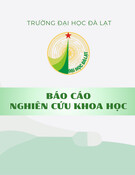
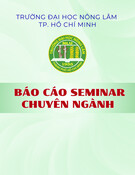
![Báo cáo seminar chuyên ngành Công nghệ hóa học và thực phẩm [Mới nhất]](https://cdn.tailieu.vn/images/document/thumbnail/2025/20250711/hienkelvinzoi@gmail.com/135x160/47051752458701.jpg)
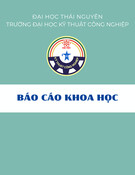
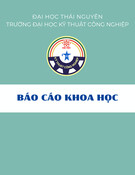
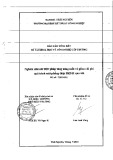
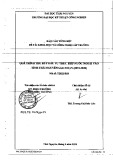














![Bộ Thí Nghiệm Vi Điều Khiển: Nghiên Cứu và Ứng Dụng [A-Z]](https://cdn.tailieu.vn/images/document/thumbnail/2025/20250429/kexauxi8/135x160/10301767836127.jpg)
![Nghiên Cứu TikTok: Tác Động và Hành Vi Giới Trẻ [Mới Nhất]](https://cdn.tailieu.vn/images/document/thumbnail/2025/20250429/kexauxi8/135x160/24371767836128.jpg)


